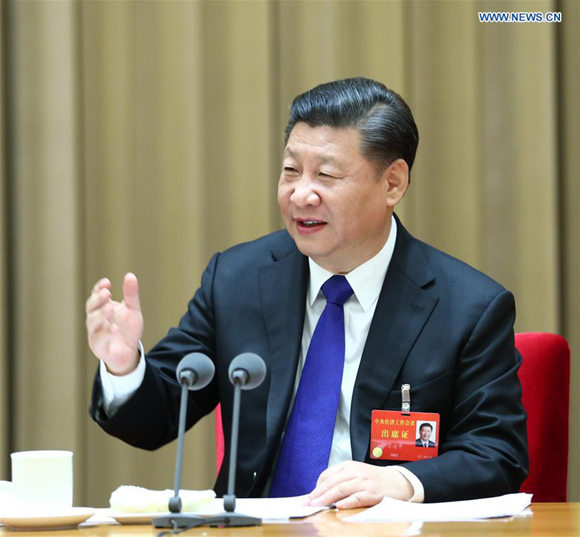
Chinese President Xi Jinping addresses the Central Economic Work Conference in Beijing, capital of China. The conference was held in Beijing from Dec. 18 to 20. (Xinhua/Xie Huanchi)
Xi Thought on socialist economy was put forward for the first time
High-quality development and forestalling risks will be the major theme of China's economic policies next year, according to decisions made at the Central Economic Work Conference, which concluded on Wednesday.
The annual meeting, which sets the tone for China's economic policies, was attended this week by President Xi Jinping, who is also general secretary of the Communist Party of China Central Committee, and all major leaders from the Party, central and local government bodies and the military. This year's meeting started on Monday.
The meeting for the first time put forward the idea of Xi Jinping Thought on Socialist Economy with Chinese Characteristics for a New Era, which mainly focuses on a new development concept and stresses the Party's leadership in economic management, people-oriented development, the new economic normal, the market's role in resource distribution and supply-side structural reform.
The thought is the "theoretical crystallization" of the past five years of practice in pushing forward China's economic development, and the "latest fruit" of socialist political economy with Chinese characteristics, according to a statement released after the meeting.
Those at the meeting decided that high-quality development is the "indispensable foundation for sustainable and healthy economic development". Apart from efficient economic growth, analysts said, high-quality development also entails balanced social and environmentally friendly development.
"Social issues, including growing inequality, social security, healthcare services and education, are priorities on the government's agenda," Margit Molnar, head of the China economics desk at the Organization for Economic Cooperation and Development, told China Daily. "The objective is lifting all boats."
Environmental concerns have prompted China to step up environmental inspections, she added. "Rigorous supervision of the phasing out of obsolete and polluting capacity in several industries is likely to contribute to reducing pollution."
Meeting participants decided China will try to make progress in "forestalling major risks, targeted poverty reduction and pollution control" while sticking to supply-side structural reform.
Participants agreed to continue to adopt a prudent and neutral monetary policy and a proactive fiscal policy, maintain "reasonable growth of credit and social financing scale", and keep the renminbi's exchange rate "basically stable at a reasonable equilibrium level".
The participants vowed to safeguard the bottom line of preventing systemic financial risks and make the financial sectors better serve the real economy.
Analysts said a main challenge for China next year is to maintain robust growth while pushing deleveraging and cutting corporate debt to prevent financial risks.
"Given that growth in the past decade or so was very much driven by debt-financed investment, deleveraging may lead to a sharp reduction in investment," Molnar said. "Therefore it is important to make sure that investment projects with a net present value obtain financing."
Meeting participants also said that China "will improve the long-term mechanism for ensuring the stable and healthy development of the real estate market" and encourage both housing rentals and purchases. It will "keep the continuity and stability of the real estate market's regulatory policies and clarify the distribution of powers among central and local governments".
Dai Yiyi, an economist at Xiamen University, said that it shows the country's real estate regulatory stance will largely remain unchanged if there are no major changes in the market situation.


















































